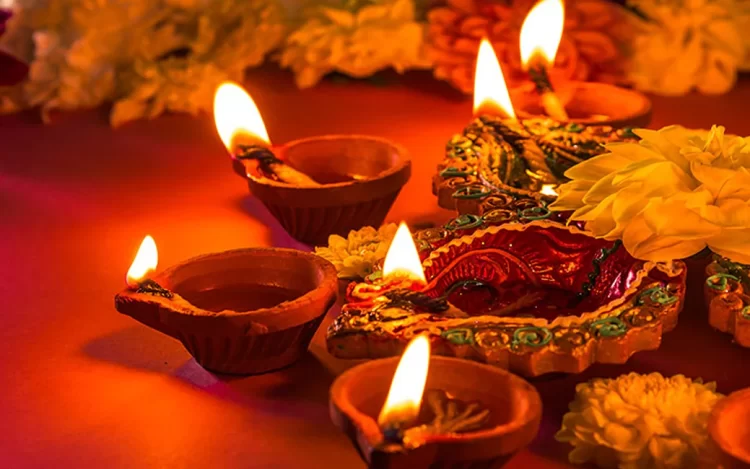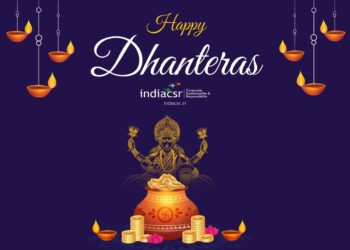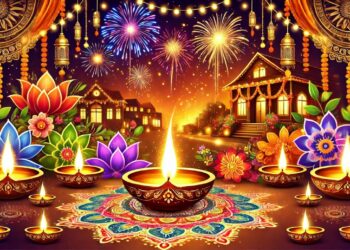Diwali, also known as Deepavali, is one of the most celebrated festivals in Hinduism, symbolizing the victory of light over darkness, good over evil, and knowledge over ignorance. Diwali is not just a festival of lights, but a time to strengthen bonds, seek prosperity, and rejoice with loved ones. As we approach Diwali 2024, let’s explore the date, history, significance, and key celebrations of this much-awaited festival.
Diwali 2024 Date
In 2024, Diwali will be celebrated on Thursday, October 31. The festival spans five days, beginning with Dhanteras on October 29 and concluding with Bhai Dooj on November 3. The main day, known for Lakshmi Puja, falls on the night of Amavasya, which is October 31 this year. Diwali brings with it not just lights and joy, but also a reflection of the values it symbolizes—hope, prosperity, and unity.

History of Diwali
Diwali’s origins are deeply rooted in Hindu mythology, with the most popular legend being that of Lord Rama. Diwali marks Lord Rama’s return to Ayodhya after defeating the demon king Ravana, following 14 years of exile. The citizens of Ayodhya celebrated his return by lighting oil lamps, or diyas, across the city, signifying the victory of good over evil.
In other parts of India, Diwali is celebrated for different reasons. In southern India, Diwali commemorates Lord Krishna’s victory over the demon Narakasura, while in western India, it signifies the day Goddess Lakshmi emerged from the ocean of milk during the churning of the sea (Samudra Manthan), symbolizing prosperity and wealth.
Also Read | 7 Diwali Light Decor Ideas For Indian Homes
Significance of Diwali: Festival of Light, Prosperity, and Family
The word Diwali comes from the Sanskrit word “Deepavali,” meaning “row of lights.” This festival, at its core, represents the triumph of light—both literal and symbolic—over darkness. It is a time when families come together to celebrate the spirit of togetherness, forgiveness, and renewal. Lakshmi Puja, performed on the main day of Diwali, is one of the central rituals where people pray to the goddess of wealth for prosperity and happiness.
The festival also honors Lord Ganesha, the remover of obstacles, and is considered an auspicious time to start new ventures or buy new things. Homes are cleaned, decorated with rangolis, and illuminated with lights, symbolizing an invitation to Goddess Lakshmi to bless the household with good fortune.
Celebrations of Diwali: Five Days of Joy
The Diwali festivities extend over five days, each with its own unique customs and rituals:
- Dhanteras (October 29, 2024): The festival kicks off with Dhanteras, dedicated to Lord Kuber, the god of wealth, and Goddess Lakshmi. On this day, it is considered auspicious to purchase precious metals such as gold, silver, or new utensils, which symbolize inviting prosperity into the home.
- Chhoti Diwali (October 30, 2024): Also known as Naraka Chaturdashi, this day celebrates Lord Krishna’s victory over the demon Narakasura. People light lamps to drive away evil spirits and decorate their homes with rangolis and flowers.
- Diwali (October 31, 2024): The main day of the festival is when families perform Lakshmi Puja and light diyas to illuminate homes and streets. Firecrackers, sweets, and family gatherings create a joyous and vibrant atmosphere. It’s a day to honor tradition, celebrate with loved ones, and enjoy a festive meal.
- Govardhan Puja (November 1, 2024): On the fourth day, devotees in northern India perform Govardhan Puja, worshipping the hill that Lord Krishna lifted to protect villagers from heavy rains. Offerings are made, and the day is celebrated with feasts.
- Bhai Dooj (November 3, 2024): The festival concludes with Bhai Dooj, celebrating the bond between brothers and sisters. Sisters apply tilak on their brothers’ foreheads and pray for their well-being, while brothers give gifts and promise protection.
Important Facts About Diwali 2024
- Global Celebrations: Diwali is celebrated worldwide, especially in countries like Nepal, Sri Lanka, Malaysia, and Singapore, along with Indian communities in the UK, USA, and Canada.
- Eco-Friendly Celebrations: In recent years, there has been a shift toward celebrating Diwali in a more eco-conscious way. Many families are choosing eco-friendly diyas, green crackers, and sustainable decor options to reduce the environmental impact.
- Significance of Colors: Red, yellow, and orange are the dominant colors during Diwali, symbolizing joy, prosperity, and new beginnings.
- Diwali and Business: For many, Diwali marks the beginning of the Hindu New Year, particularly for business owners in Gujarat and Rajasthan. New account books are opened, and old ones are closed, signifying a fresh start.
- Mythological Variations: While the return of Lord Rama is the most common legend associated with Diwali, other regions celebrate Diwali for different reasons, such as the worship of Goddess Kali in Bengal and the victory of Lord Vishnu over Bali in South India.
You Learn: Diwali 2024 – A Time for Light and Joy
Diwali 2024 promises to be a grand celebration of light, love, and prosperity. Whether it’s through the lighting of diyas, sharing sweets, or enjoying the brilliance of fireworks, the essence of Diwali remains a celebration of hope, renewal, and the victory of good over evil. As families come together to honor ancient traditions, the festival continues to inspire joy and unity in communities around the world.
Also Read | Top 10 Unique Diwali Gift Ideas for Family and Friends
FAQs about Diwali 2024
1. When is Diwali in 2024?
Diwali will be celebrated on Thursday, October 31, 2024, with festivities spanning from October 29 (Dhanteras) to November 3 (Bhai Dooj).
2. Why is Diwali celebrated?
Diwali symbolizes the victory of light over darkness and good over evil. It commemorates Lord Rama’s return to Ayodhya after defeating Ravana, along with other regional legends.
3. What are the five days of Diwali?
The five days of Diwali are Dhanteras, Chhoti Diwali (Naraka Chaturdashi), Diwali (Lakshmi Puja), Govardhan Puja, and Bhai Dooj.
4. What are some eco-friendly Diwali celebrations?
Eco-friendly Diwali celebrations include using clay diyas, green crackers, organic rangoli colors, and sustainable decorations to reduce environmental impact.
5. What is the significance of Lakshmi Puja?
Lakshmi Puja, performed on the main day of Diwali, is a prayer to Goddess Lakshmi for wealth, prosperity, and happiness in the household.






















